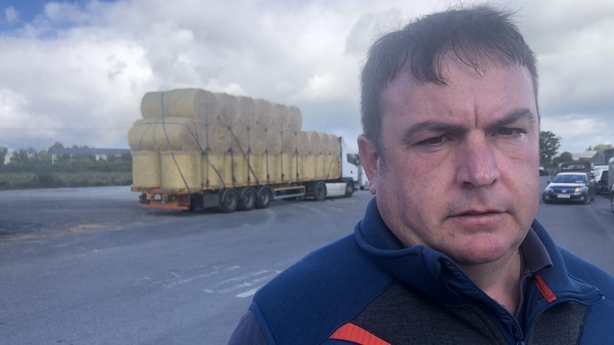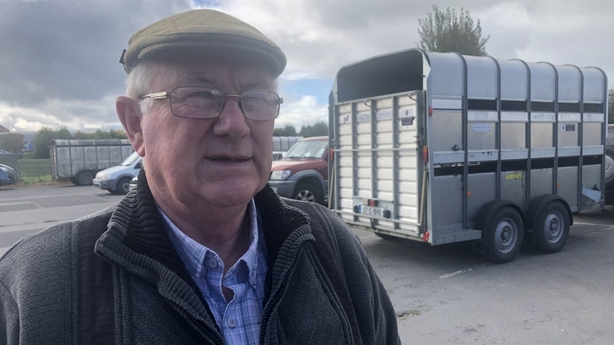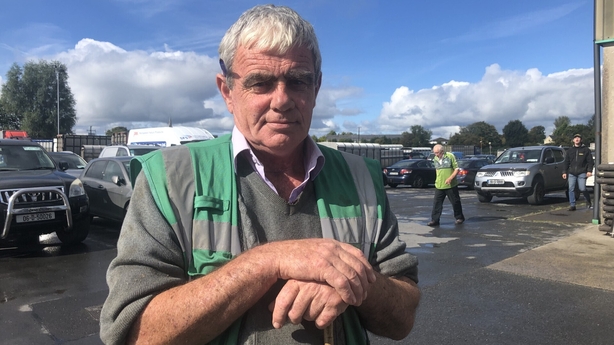The volatility of farm incomes, the loss of young farmers in the business and being strangled by red tape are all issues on the minds of farmers as they consider what might be in store for the agriculture industry in the upcoming Budget.
At the busy Clare Marts arena in Ennis in Co Clare, farmers say this is the last opportunity for the Government to honour a promise made five years ago in the Programme for Government to introduce an income volatility measure.
The measure would allow farmers to use the income they made in a good year to cover the poor returns in a bad year, without penal tax applying.
We need your consent to load this rte-player contentWe use rte-player to manage extra content that can set cookies on your device and collect data about your activity. Please review their details and accept them to load the content.Manage Preferences
Micheál O’Dwyer, a dairy farmer from Doora outside Ennis in Co Clare, said the Government has yet to make good on its commitment to introduce such a measure.

He said: "This is something referenced several times over the past five years, but which has yet to materialise and that is where farmers would be allowed set aside profits from a good year of production free from tax, to be used during a bad year, and that those profits would only be taxed when they are drawn down."
Mr O’Dwyer noted that insecurity in relation to farmer incomes "is becoming a huge issue".
He said that farmers in a good year "end up paying a lot of tax on their income", adding that the following year "they could be struggling after paying a huge tax bill".
"An income volatility measure would allow farmers to set money aside and bring it back into play in a bad year," he added.
Mr O’Dwyer said: "This is the last budget opportunity to make good on that commitment and we're hoping to see changes to that.
"Farmers are very annoyed, there has been no progress on that."
The exodus of young farmers from the sector is on the mind of drystock farmer Martin McMahon from O'Callaghan Mills in Co Clare.
He said young people are not staying in farming due to the very difficult work commitment for an insufficient income.
Mr McMahon said the Government must "get serious on the issue of supporting young farmers to stay in the business".
"Without young people in farming, we're going nowhere," he said.
He said that co-ops and meat plants "are beginning to realise that they will not have the essential food products which were such an emblem of our farm production over the years".

"The raw product is what keeps these places going … our milk, our beef and other foods which are produced to such a high standard.
"If the producers are not there, then there's trouble ahead."
Inheritance tax for farmers is also vexing Mr McMahon, who said it is a huge issue for the Government to address.
He said: "Farmers are being outbid for land when they are up against big bidders who are not farmers buying land as an asset and passing it onto family without paying tax.
"Farmers cannot compete with that when they need extra land for dairying or whatever, and then they are up against people who can blow them out of the water.
"This is a problem which has to be solved."
The future for young farmers is also worrying Caitríona Power.

Ms Power, a young farmer who runs a dairy farm along with her parents in Kilnamona, said the Government needs "to look at the issue of generational renewal".
"There are plenty of young farmers out there who want to be farming full time but cannot build a career because of lack of access to land, whether it be that their parents cannot afford to step back and hand it over, or they cannot afford the land themselves because of the cost," Ms Power said.
The cost, she said, is "frequently driven up by spiralling prices when there are many bidders for few plots".
"It’s forcing many young farmers to go abroad," she said.
Ms Power said: "Today an average farm is not enough to keep two families going, so the Government need to look at a retirement scheme to make it easier for the older farmer to step down and the younger member to take on the duties full time."
She contends that the Government must "prioritise young farmers because at the end of the day if young farmers aren’t coming up, where are we going to be?"
"You need farmers working seven days a week, 52 weeks of the year and the love of it is going when you see these long hours, but they must be supported for the future," she added.
The struggle against red tape is on the mind of Andrew Cotter.

"I’d like to see less red tape anyway and farmers paid on time for what they are due in their grants," he said.
Mr Cotter said farmers cannot "fill forms in on paper like before".
"Many farmers are not bothered with online and in some cases, farmers are waiting a year-and-a-half for payment," he said.
Mr Cotter described this process as "a joke".
The Government is due to deliver the Budget on Tuesday 1 October.
Farmers will be watching closely.







